“The core that will kill me has not yet been cast!”
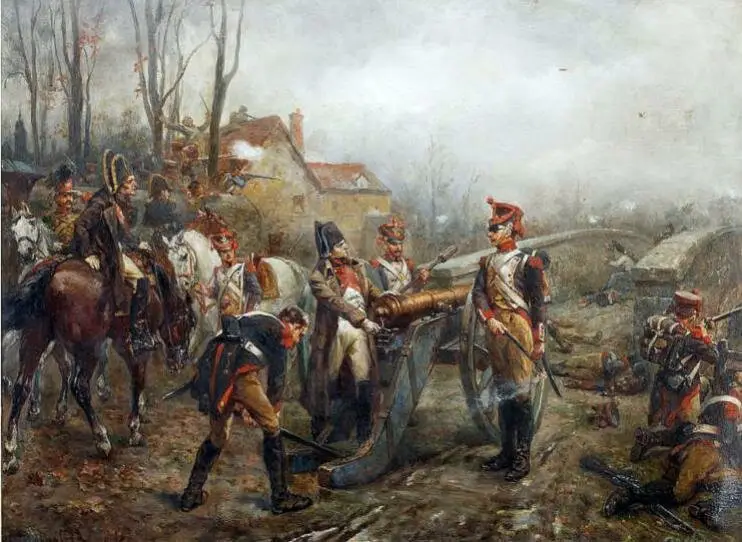
Napoleon at the Battle of Montreux. Robert Alexander Hillingford
Allied disagreements and the lack of unity of command had a negative impact on the conduct of military operations. Napoleon defeated Schwarzenberg's corps at Morman and Montreux, repelling the first attack on Paris.
prehistory
As a result of Napoleon's swift and brilliant actions in the Six Day Campaign (Napoleon's Six Day War) The Silesian army lost almost a third of its personnel, was seriously weakened and morally depressed. Blucher's army was saved from complete defeat by the advance of the Main Army, which began to threaten Paris.
News of Napoleon's victories inspired the Parisians. From the moment the Allied armies entered the territory of eastern France and their advance to the west, the front was rapidly approaching Paris. The mood of Parisians and high society was depressed. In salons, palaces and auditoriums they discussed the emperor's victories and hoped for new ones. True, soon the Russian detachments of generals Platov and Seslavin carried out raids in the vicinity of Nemours, Fontainebleau and Orleans, which again spoiled the mood of the French.
Meanwhile, the Main Army under Schwarzenberg continued to be stationed at Troyes, making minor maneuvers in separate corps. The Russian Emperor Alexander Pavlovich, having learned about the situation of Blucher's army, demanded active action from the commander-in-chief. Schwarzenberg, who had a secret order from the Viennese court not to cross the Seine, was forced to intensify his activity. His advanced corps advanced to the Seine. The French barriers of Victor and Oudinot retreated without a fight.
On the Allied right flank, Wittgenstein's Russian corps advanced to and occupied Nogent-sur-Seine. The Russian general was tired of the slowness of the Austrian commander-in-chief, and he went further, pushing forward, to Nanji, the vanguard of Palen (4 thousand people), which occupied both this town and the next one - Morman. Headquarters ordered Wittgenstein to return to Provins. Wrede's Bavarian corps advanced to Bray, the Württemberg corps of the Crown Prince of Württemberg - to Montero (on the Seine), the Austrian corps of Coloredo and Giulai moved through the Ionne (the left tributary of the Seine) to Fontainebleau.
Each corps marched in a separate column, at a considerable distance and without communication with each other. A strong reserve under the command of Barclay de Tolly remained at Troyes. As a result, Schwarzenberg, like Blücher, scattered his forces.
Napoleon wanted to finish off Blucher by destroying his forces in Chalons, then go through Vitry and go to the rear of the main forces. Thus, the Main Allied Army could find itself between two French groups. But, having learned about the Russian advance towards Paris (the allies were 3-4 marches from the capital), he did not take risks and immediately opposed Schwarzenberg.
To secure his rear, the emperor sent Marshal Mortier to Villers-Coteret and Marmont to Chalons, and General Grouchy to Laferte-sous-Juar. On February 15, Bonaparte hurried with the imperial guard on a forced march (some of the infantry rode on requisitioned carts) from Montmiral to Meaux. It took the emperor about a day and a half to cover almost 90 versts with his troops, arrive in Guin (Guin) on February 16 and join the corps of Marshals Victor, Oudinot and MacDonald.
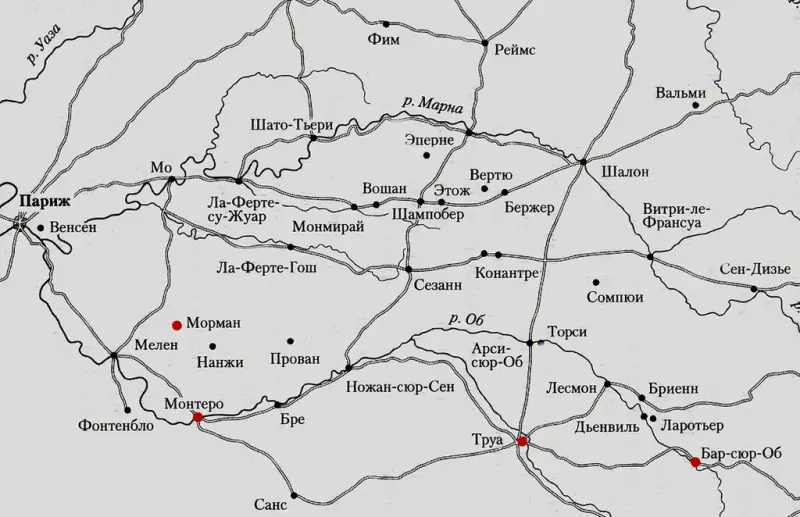
Battle of Morman
At dawn on February 5 (17), 1814, Napoleon personally led his troops (18 thousand soldiers) south from Guin along the road to Nanji. The corps of Marshal Victor, marching in the vanguard, discovered the enemy at Morman early in the morning and, preparing for battle, attacked the vanguard of Count Palen, who did not expect the enemy to appear.
The small Russian detachment could not provide serious resistance to the French. Palen began to retreat: the artillery marched along the high road, followed by infantry regiments, in the rearguard there were two guns with infantry cover, and cavalry on the flanks. Palen several times asked for help from the nearby Austrian vanguard, General Ignatius zu Hardegg from Wrede's corps, but he had orders not to engage in battle and refused.
The French defeated the Russian detachment when it walked through Morman. The French cavalry surrounded the city from the east and west. A fight ensued. The French cavalry scattered the Russians and attacked the infantry. Then, by order of Napoleon, they brought up the guards artillery (36 guns) and began to shoot the retreating Russian squares with grapeshot. Near the village of Nanji, under the pressure of French cavalry and artillery, the Russian detachment was able to disperse. The Russian cavalry managed to break through, but almost all the infantry were destroyed or captured.
Palen's adjutant Ivan Levenshtern described this hour in his memoirs:
The losses of Russian troops amounted to 2 people (according to other sources - 114 thousand, including 3 thousand prisoners) and 2 guns. Wittgenstein took full responsibility for this defeat and completely exonerated Count Pahlen. Wittgenstein withdrew the corps behind Provins.
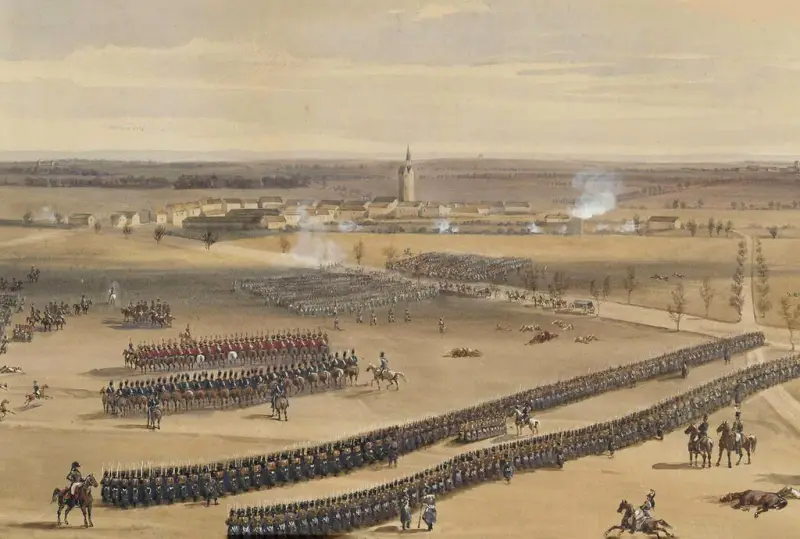
Battle of Morman. Hood. Jean-Antoine-Simeon Faure
Battle of Montreux
Having reached Nanja, Napoleon divided his army into three columns. Marshal MacDonald's corps headed to Bray, where along the way it defeated Hardegg's vanguard, and then pushed back the rest of the troops of General Wrede's corps. Marshal Oudinot's corps, pursuing General Wittgenstein, stopped a few miles from Provins.
Marshal Victor's corps departed for Montreaux (Montero), but near the village of Villeneuve it met with Delamotte's Bavarian division and got involved in battle. The Bavarians suffered heavy losses - about 2,5 thousand soldiers (1,5 thousand prisoners). The Bavarian division barely escaped complete destruction. Then Victor gave his troops a rest, and did not rush, as Napoleon demanded, to get ahead of the enemy and take advantageous positions near the village of Montero by the evening of February 17. For which the next day he was removed from command of the corps by the angry emperor.
Meanwhile, the headquarters of the Main Army learned about the defeat of Count Palen at Morman. Field Marshal Schwarzenberg, despite an almost two-fold advantage in manpower over the enemy, immediately became frightened and on the evening of February 17 sent Count Parr to Napoleon in Nanji, offering a truce.
But Napoleon, inspired by a series of victories, refused. In the morning he wrote to Brother Joseph:
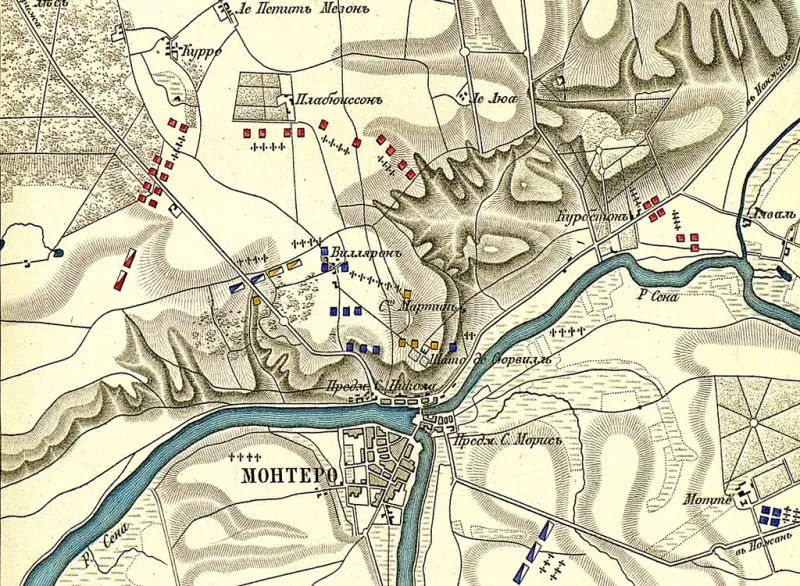
Battle of Montreux
After spending the night at the castle of Nangis, Bonaparte the next day went to the village of Montreux, located at the confluence of the Yonne and Seine rivers. The French avant-garde in the early morning of February 6 (18), 1814, approached Montreux from both sides. Pajol's 6-strong detachment reached the left wing of the Allies, and later Victor and Gerard's 9-strong detachment reached their right wing.
The Allies were in a strong position. The dominant heights controlling the bridge and the city on the right bank of the Seine, near the castle of Surville and the village of Villaron, were occupied by the forces of the Württemberg corps under the command of Crown Prince William of Württemberg. They were reinforced by two Austrian divisions; in total, under the command of the prince there were 18 thousand soldiers with 40 guns.
Pajol's first attack on the position was repulsed. Then the approaching French divisions of Chateau and Duhem entered the battle. A fierce battle began, during which the French were able to break into Villaron, but it was soon driven back by the Württembergers. During the second attack, the French again occupied this settlement, but were again repulsed. General Chateau was mortally wounded and died in the arms of Marshal Victor. The Allies retained their positions.
But by noon reinforcements arrived, General Gerard, appointed corps commander instead of Victor, with reserves. He, having advanced his artillery, began shelling the center and right flank of the Württemberg corps, and also repelled the enemy attack that had begun. The French forces increased to 30 thousand people.
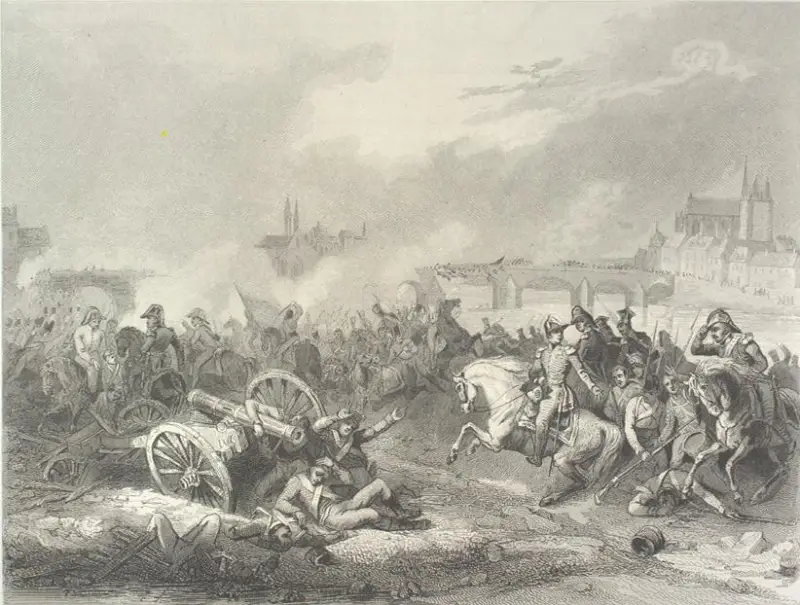
Battle of Montro. Engraving on the painting Langlois
By two o'clock in the afternoon Napoleon arrived, causing delight and excitement among the troops. The emperor appeared at the moment when, under enemy pressure, the Württembergers began to retreat across the only bridge to the other side of the Seine.
Risking being killed, Bonaparte moved to the most dangerous place, where cannonballs fell and bullets whistled, remembering his artillery past, he began to aim the guns. When asked to leave a dangerous place from shelling for cover, Napoleon replied:
Having retreated to the left bank of the river, the allies tried to destroy the bridge across the river, but it survived. In the city itself, local residents also attacked them, throwing stones and shooting from windows. Nevertheless, the rearguard of the Crown Prince of Württemberg was able to protect the rest of the troops from pursuit by the enemy cavalry and made it possible to withdraw them to Bre.
During the battles of Montreux, the coalition lost about 5–6 thousand people (almost half of them prisoners), but the French also lost about 2,5 thousand people.
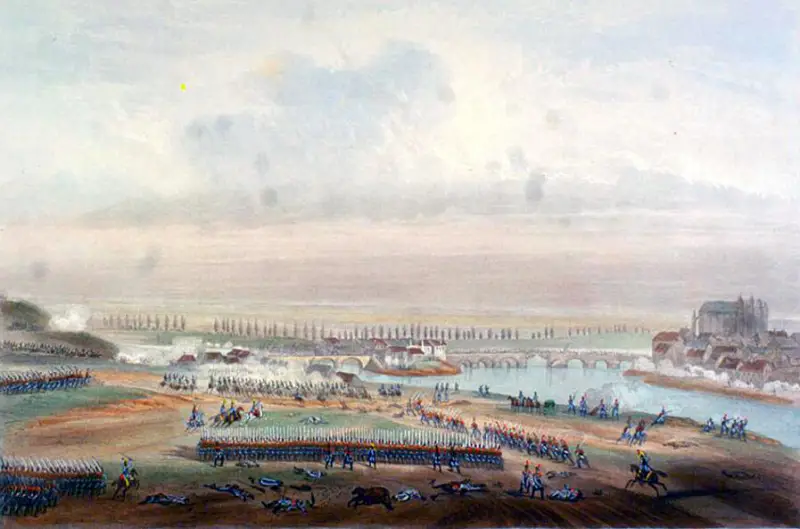
Battle of Montreux on the banks of the Seine. Colorized engraving from the 19th century. Adolphe Rouargue
During the analysis of the battle, the emperor, in addition to distributing awards, did not forget to reproach those who, in his opinion, acted erroneously and not quickly enough: generals Guy, Montbrun, Dijon. But Marshal Victor suffered the most: “The Duke of Bellun was to arrive at Montreux on the evening of the 17th; he stayed at Salen: this is an important mistake. Occupying the bridges of Montreux would give the emperor a whole day and would allow him to destroy the Austrian army...” The emperor invited him to leave the army.
Victor, who had lost his son-in-law, the brave General Chateau, replied: “If I am guilty of this mistake, then I am severely punished for it by a blow that struck my family... I will take a gun; I have not yet forgotten my former craft; Victor will join the ranks of the guard." This greatly touched Bonaparte. Recalling the marshal’s past merits, the emperor said: “Stay with me, Victor, I cannot return your squad to you, because I gave it to Gerard; but I give you two guards divisions; take command over them, and everything between us is forgotten...”
In order to encourage Paris, as well as to more impressively present his successes in the campaign, the emperor ordered the banners captured in battles and several thousand prisoners of war to be sent to the capital. The prisoners, accompanied by drummers, gendarmes and national guards, were paraded through the streets of Paris for several days. There were Russians here (captured generals Olsufiev and Poltoratsky were the first to enter the city), Prussians and Austrians. It is worth noting that the Parisians showed humanity and pity for the prisoners and gave them money and food.
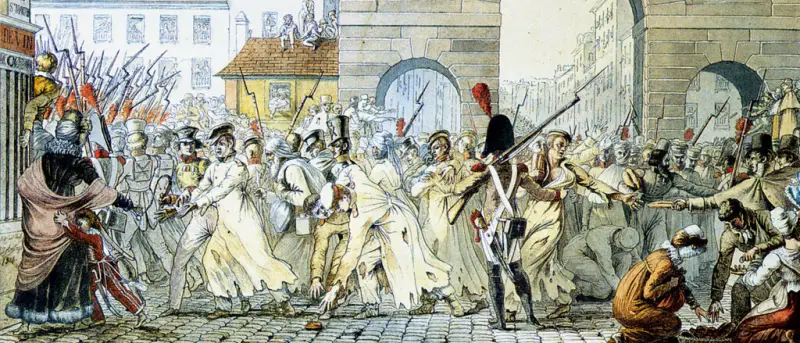
Defile of Russian prisoners along the Boulevard San Martin in February 1814. Jean-Etienne Delescluze
The Austrian commander-in-chief led the army to Troyes. Fearing the advance of Marshal Augereau from Lyon, Schwarzenberg asked Blücher to come to his aid and join the right flank. Blucher, pushing back Marmont's corps, went to the Au River and occupied Mary-sur-Seine. On February 22, Schwarzenberg began to withdraw troops to Chaumont and Langre.
He also sent a letter to Marshal Berthier (Napoleon's chief of staff) asking for a truce, and to Napoleon's headquarters another envoy, his adjutant, the Austrian General Liechtenstein.
Napoleon occupied Troyes after the departure of the allies.
On the morning of February 25, the three monarchs again convened a council of war in Bar-sur-Aube, to which military leaders and diplomats were invited. Schwarzenberg wanted to continue the retreat beyond the Ob River line, due to a lack of provisions and fodder, the hostility of the population and the spread of disease among the troops.
Alexander I still advocated an attack on Paris. Blucher, who the day before asked permission to launch an independent attack on the French capital, received it. His army became the main one in the offensive, it was transferred to the Russian corps of Wintzingerode coming from Holland and the Prussian Bülow from Bernadotte’s Northern Army (they were located at Reims and Laon).
The Silesian army almost doubled its size.
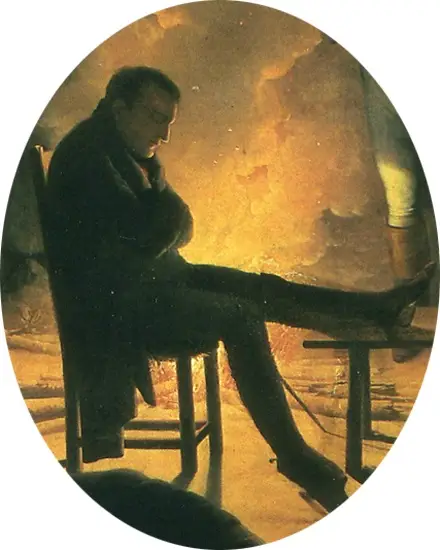
Napoleon at bivouac. Adolf Rohn
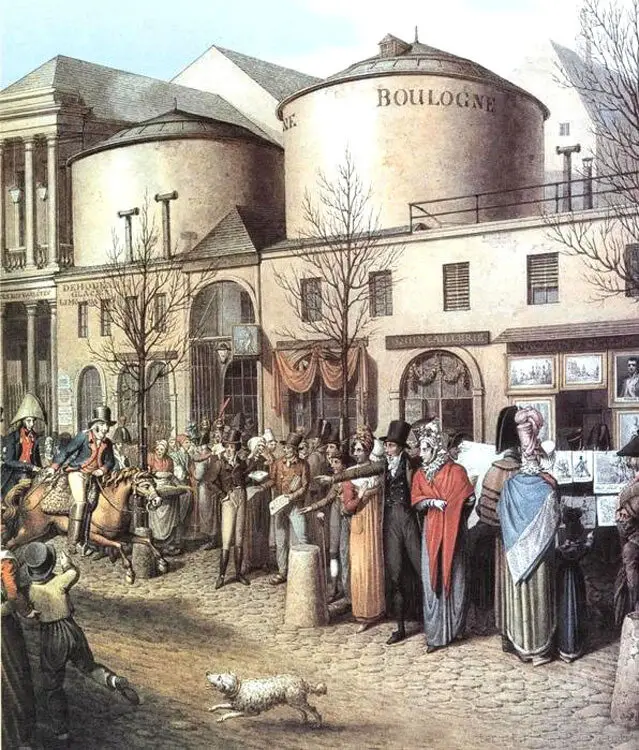
Information